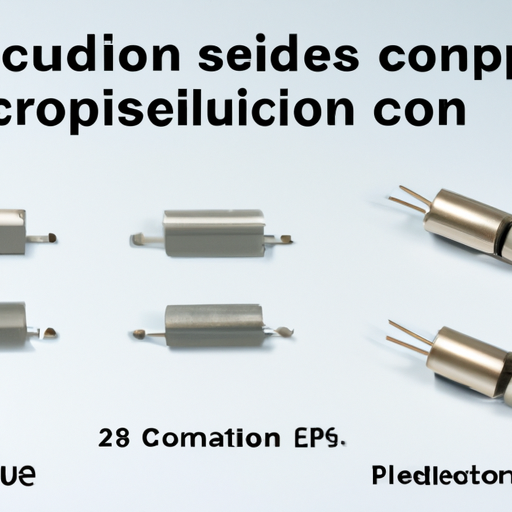Title: Exploring the Common Production Processes for Special Resistors

1. Thick Film Technology (200 words) One of the most widely used production processes for special resistors is thick film technology. This technique involves depositing a resistive paste onto a substrate, typically made of ceramic or glass, using screen printing or other similar methods. The paste is then cured at high temperatures to form a resistive layer. Thick film resistors offer excellent stability, high power handling capabilities, and a wide range of resistance values. They are commonly used in power electronics, automotive applications, and industrial control systems.
2. Thin Film Technology (200 words) Thin film technology is another popular production process for special resistors. In this method, a thin layer of resistive material, such as tantalum nitride or nichrome, is deposited onto a substrate using techniques like sputtering or evaporation. The thickness of the film determines the resistance value. Thin film resistors offer superior precision, low noise, and excellent stability over a wide temperature range. They are commonly used in high-frequency applications, medical devices, and aerospace systems.
3. Wirewound Technology (200 words) Wirewound technology is a production process that involves winding a resistive wire, typically made of alloys like nichrome or constantan, around a ceramic or fiberglass core. The wire is then coated with an insulating material to protect it from external influences. Wirewound resistors offer high power handling capabilities, excellent stability, and low temperature coefficients. They are commonly used in power supplies, amplifiers, and measurement equipment where high precision and accuracy are required.
4. Foil Technology (200 words) Foil technology is a specialized production process used for precision resistors. It involves cutting a resistive foil, typically made of nickel-chromium or manganese-copper, into a specific pattern and then mounting it onto a ceramic or fiberglass substrate. The foil is protected by a layer of epoxy or glass to ensure stability and durability. Foil resistors offer exceptional precision, low temperature coefficients, and excellent long-term stability. They are commonly used in precision measurement instruments, medical equipment, and aerospace applications.
5. Carbon Composition Technology (200 words) Carbon composition technology is an older production process that is still used for certain special resistors. It involves mixing carbon particles with a binder material, such as clay or resin, and then compressing the mixture into a cylindrical shape. The resistor is then coated with an insulating material and color-coded for identification. Carbon composition resistors offer high power handling capabilities, good stability, and a wide range of resistance values. They are commonly used in audio equipment, power supplies, and industrial applications.
Conclusion (100 words) Special resistors are essential components in various electronic systems, providing unique characteristics and functionalities to meet specific requirements. The production processes discussed in this article, including thick film, thin film, wirewound, foil, and carbon composition technologies, enable the creation of special resistors with different properties and capabilities. By understanding these production processes, engineers and designers can select the most suitable resistor type for their specific applications, ensuring optimal performance and reliability.
Title: Exploring the Common Production Processes for Special Resistors

1. Thick Film Technology (200 words) One of the most widely used production processes for special resistors is thick film technology. This technique involves depositing a resistive paste onto a substrate, typically made of ceramic or glass, using screen printing or other similar methods. The paste is then cured at high temperatures to form a resistive layer. Thick film resistors offer excellent stability, high power handling capabilities, and a wide range of resistance values. They are commonly used in power electronics, automotive applications, and industrial control systems.
2. Thin Film Technology (200 words) Thin film technology is another popular production process for special resistors. In this method, a thin layer of resistive material, such as tantalum nitride or nichrome, is deposited onto a substrate using techniques like sputtering or evaporation. The thickness of the film determines the resistance value. Thin film resistors offer superior precision, low noise, and excellent stability over a wide temperature range. They are commonly used in high-frequency applications, medical devices, and aerospace systems.
3. Wirewound Technology (200 words) Wirewound technology is a production process that involves winding a resistive wire, typically made of alloys like nichrome or constantan, around a ceramic or fiberglass core. The wire is then coated with an insulating material to protect it from external influences. Wirewound resistors offer high power handling capabilities, excellent stability, and low temperature coefficients. They are commonly used in power supplies, amplifiers, and measurement equipment where high precision and accuracy are required.
4. Foil Technology (200 words) Foil technology is a specialized production process used for precision resistors. It involves cutting a resistive foil, typically made of nickel-chromium or manganese-copper, into a specific pattern and then mounting it onto a ceramic or fiberglass substrate. The foil is protected by a layer of epoxy or glass to ensure stability and durability. Foil resistors offer exceptional precision, low temperature coefficients, and excellent long-term stability. They are commonly used in precision measurement instruments, medical equipment, and aerospace applications.
5. Carbon Composition Technology (200 words) Carbon composition technology is an older production process that is still used for certain special resistors. It involves mixing carbon particles with a binder material, such as clay or resin, and then compressing the mixture into a cylindrical shape. The resistor is then coated with an insulating material and color-coded for identification. Carbon composition resistors offer high power handling capabilities, good stability, and a wide range of resistance values. They are commonly used in audio equipment, power supplies, and industrial applications.
Conclusion (100 words) Special resistors are essential components in various electronic systems, providing unique characteristics and functionalities to meet specific requirements. The production processes discussed in this article, including thick film, thin film, wirewound, foil, and carbon composition technologies, enable the creation of special resistors with different properties and capabilities. By understanding these production processes, engineers and designers can select the most suitable resistor type for their specific applications, ensuring optimal performance and reliability.